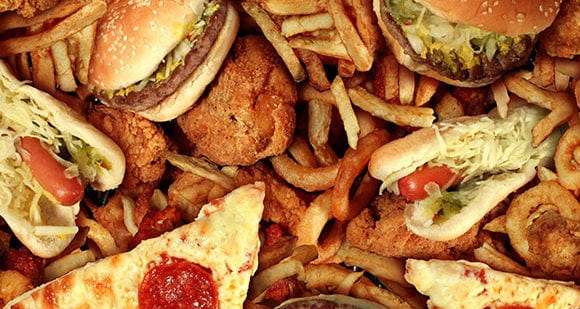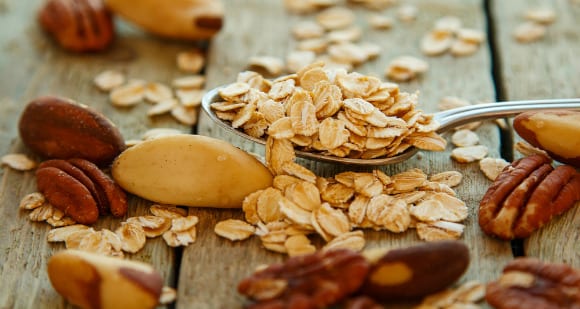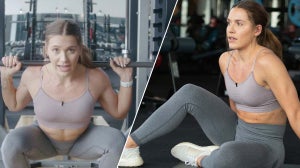
Written by Jamie Wykes Hobday
Everything You Need To Know About Fats
With regards to macronutrients; protein is seen as the key to muscle growth whilst carbohydrates are at the forefront of discussion. But what about fats? What role do they play? What is their importance? Below is a detailed guide as to what fats are, the role they play and the benefits you can expect from incorporating them into your daily routine.

What Are Fats?
Typically, due to their name; fats have a rather dimming view in the general public. The common misconception is that ‘fats will make you fat.’ However, fats can help you lose fat! Fats are a macronutrient that should play an essential role in our day to day life and nutritional habits. Fats are also known as triglycerides and one fat cell is comprised of 3 fatty acid chains with one central glycerol molecule.
With reference to food intake and caloric considerations; one gram of fat is equal to nine calories (4 grams of fat is 36 Calories), making them one of the macronutrient groups that should be carefully monitored due to how calorically heavy they are. In terms of categorising fats; fats are broken down into four different sub-categories.
Saturated Fats:
Dairy sources and red meats such as milk, cheese, butter and steak. Saturated fats should be monitored carefully and consumed in moderation due to excess amounts leading to a high cholesterol level.
Essentially; high cholesterol levels will be generated by numerous LDL’s being produced. They can bring particular benefits such as increased liver health and improved bone structure strength. Therefore, it is suggested that 10-15% of your daily fat intake is comprised of saturates.

Polyunsaturated Fats:
Polyunsaturated fats are seen as the healthier option in regards to fat due to the thriving advantages you can gain from consuming them on a daily basis, examples include; salmon, vegetable oils, nuts and some seeds.
Monounsaturated Fats:
Foods such as olives, avocados and nuts are a beneficial source of monounsaturated fat. Positives of monounsaturated fats include reduced cholesterol level and (if combined with a caloric deficit) weight loss.
Alternatively, these ‘good fats’ can be consumed in supplement form as a last resort of whole food alternatives. Supplements such as omega 3 & 6 fish oils are a highly efficient substitute as a means of mono/polyunsaturated fat intake.
Trans Fats:
Deep fried foods such as doughnuts, fish and chips, chicken nuggets. This is the food group that should generally be avoided due to their role in the cardiovascular system.
Risks of consuming excess trans fats include; lowering your good cholesterol (HDL), increasing your bad cholesterol (LDL) and promoting a higher chance of cardiovascular diseases. This isn’t to say you CAN’T eat them, but like anything; acknowledge the risks of excess amounts and consume in moderation.

The Benefits Of Fats
#1 Improves body composition (the proportion of fat-free mass and fat within the human body). By reducing cravings, speeding up your metabolism and their hormone interaction (below); fats can help your body composition and appearance.
#2 Balances the hormonal system
#3 Eating the right fats (mono’s, poly’s and even saturates in moderation) have been shown to lower the ratio of good cholesterol: bad cholesterol. As a result of this; LDL’s will be decreased whilst HDL’s will be increased; leading to a healthier cardiovascular system due to lowered cholesterol levels.
#4 Improves your libido: a lack of monounsaturated/polyunsaturated fats for a male will result in lowered testosterone count. Along with decreased androgynous hormones, not only will this result in a lowered libido but also a less efficient reproductive system.
#5 Vitamin digestion and absorption: Unsurprisingly; fat-soluble vitamins (A, D, E and K) are the vitamins involved. These vitamins are absorbed and digested at a far greater rate when combined with good fats in the body.
Fat As A Snack
Whilst you should realistically snack on fat sources in moderation due to the caloric density they contain; they are a preferred snack in comparison to carbohydrates. Whilst carbohydrates are by no means the enemy; they are the most sufficient when timed pre/intra/post workout for energy stores and preventing glycogen depletion.
In addition to this; selecting fats or proteins as a snacking source over carbohydrates will also, in turn, reduce exercise inflammation, insulin sensitivity and your metabolism (the rate at which your body will burn fat). Whilst we may have come to terms with the benefits of fats and the benefits to using them as a snack; it is not every day that you will be able to grab a 200-gram fillet of salmon for a quick omega hit!
So, what practical fat sources can we look at for someone on the go with a typically busy lifestyle? Naturally; look no further than sources such as nuts (pecans, walnuts, almonds), oils in coffee/green tea (coconut oil) and nut butter (peanut butter, cashew butter, almond butter). These are all convenient, practical and taste great! No excuses.

How Much Do I Have Per Day?
Whilst everyone will have their preference to consumption levels and amounts will vary dependent on goals/type of diet; it is quite common to use consume 0.4 grams per pound of bodyweight; this is a sturdy suggestion and probably the most popular method available at the moment due to its simplicity to calculate and how realistic the answer is to consume on a daily basis.
Essentially, take your bodyweight in pounds and multiply it by 0.4; this is your recommended daily fat intake. For example; a 200-pound man will consume 80 grams of fat on a daily basis (200x0.4).
Our articles should be used for informational and educational purposes only and are not intended to be taken as medical advice. If you're concerned, consult a health professional before taking dietary supplements or introducing any major changes to your diet.

Casey Walker is an experienced sports nutrition new product development technologist. He holds a Bachelor of Science in Sports and Exercise Science and a Master of Science in Sports Sciences and Physiology.
Casey’s scientific research area of expertise lies in the effects of dietary nitrates on sprint performance and exercise-induced muscle damage. He has also worked as a sports scientist for a medal-winning Paralympic track cyclist, with a goal of qualifying for the Rio 2016 Paralympics.
Find out more about Casey’s experience here.
In his spare time, Casey is a keen middle-distance runner with an interest in triathlon. He’s always looking out for the latest blends and supplements to improve his half-marathon time and recovery.







